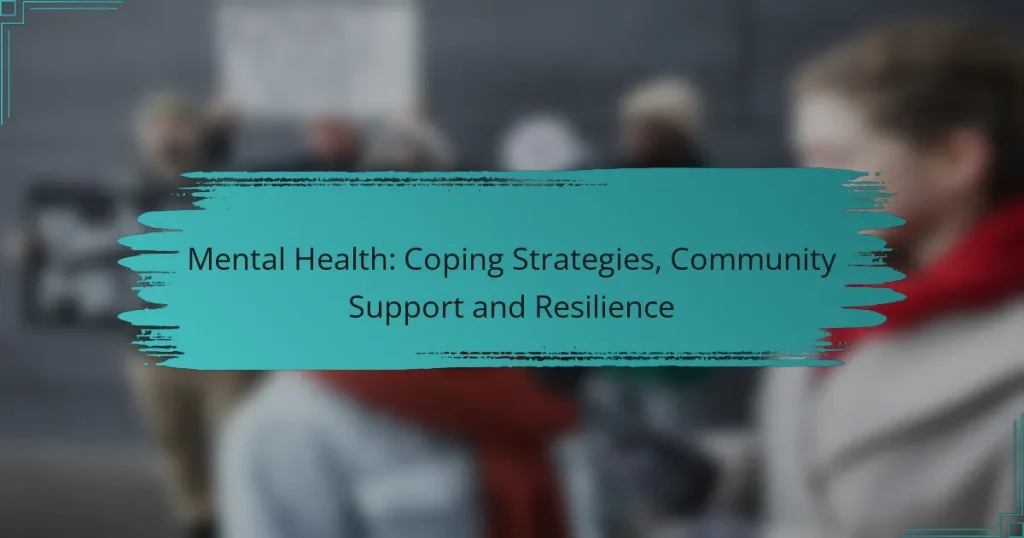Mental health is a vital aspect of overall well-being, and effective coping strategies can play a significant role in managing stress and building resilience. Techniques such as mindfulness meditation, physical exercise, and journaling, along with community support, foster a sense of belonging and shared experience. By cultivating resilience, individuals can better adapt to life’s challenges and maintain a positive outlook, essential for emotional wellness.
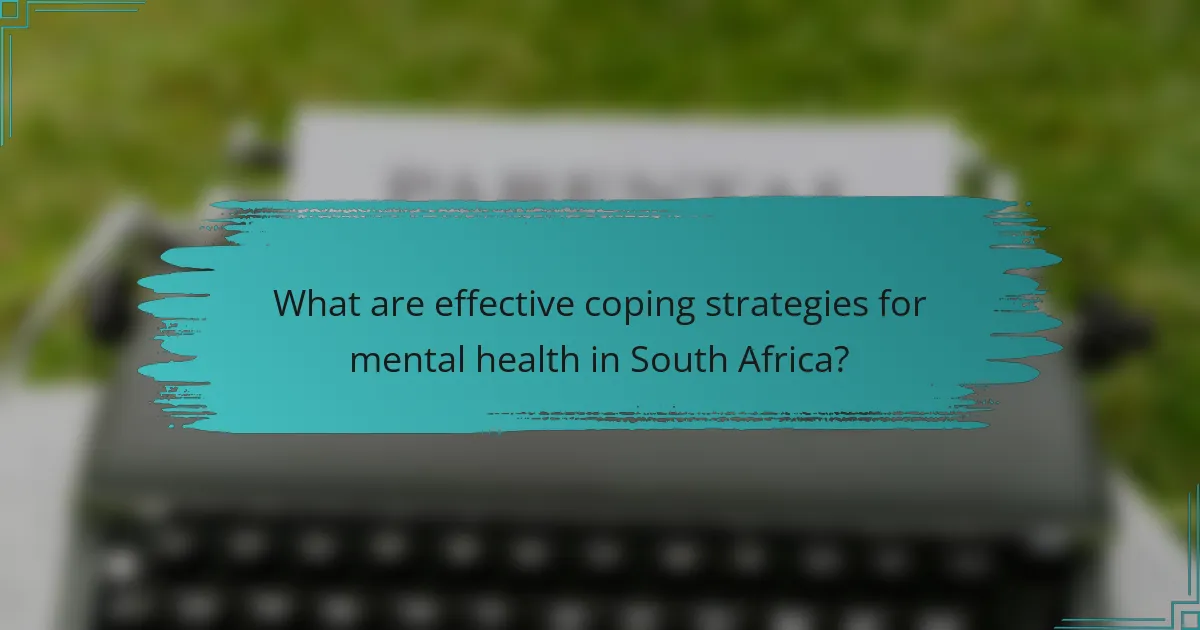
What are effective coping strategies for mental health in South Africa?
Effective coping strategies for mental health in South Africa include mindfulness meditation, physical exercise, journaling, support groups, and therapeutic art. These methods can help individuals manage stress, improve emotional well-being, and build resilience in challenging times.
Mindfulness meditation
Mindfulness meditation involves focusing on the present moment and accepting it without judgment. This practice can reduce anxiety and improve emotional regulation, making it a valuable tool for mental health. In South Africa, many community centers offer free or low-cost classes to help individuals get started.
To practice mindfulness, set aside a few minutes daily to sit quietly, breathe deeply, and observe your thoughts. Apps and online resources can guide you through various techniques, making it accessible for everyone.
Physical exercise
Physical exercise is a powerful coping strategy that boosts mood and reduces stress. Engaging in regular physical activity, such as walking, running, or participating in sports, can lead to significant improvements in mental health. Aim for at least 150 minutes of moderate exercise each week.
In South Africa, community sports leagues and fitness classes provide opportunities for social interaction, which can further enhance mental well-being. Consider joining a local group to stay motivated and connected.
Journaling
Journaling is an effective way to process emotions and reflect on daily experiences. Writing about your thoughts and feelings can help clarify issues and reduce stress. Set aside time each day or week to jot down your reflections, focusing on both positive and negative experiences.
To get started, consider prompts like “What am I grateful for today?” or “What challenges did I face this week?” This practice can foster self-awareness and emotional resilience.
Support groups
Support groups provide a safe space for individuals to share experiences and feelings with others facing similar challenges. These groups can be found in various settings, including community centers, hospitals, and online platforms. Participating in a support group can reduce feelings of isolation and provide valuable coping strategies.
In South Africa, many organizations offer support groups for specific issues, such as depression, anxiety, or trauma. Look for local resources or online communities to find a group that resonates with you.
Therapeutic art
Therapeutic art involves using creative expression as a means of coping with mental health challenges. Engaging in activities like painting, drawing, or crafting can provide an outlet for emotions and promote relaxation. This form of therapy is accessible to everyone, regardless of artistic skill.
In South Africa, workshops and community art programs often focus on mental health benefits. Participating in these activities can foster connections with others while enhancing emotional well-being.
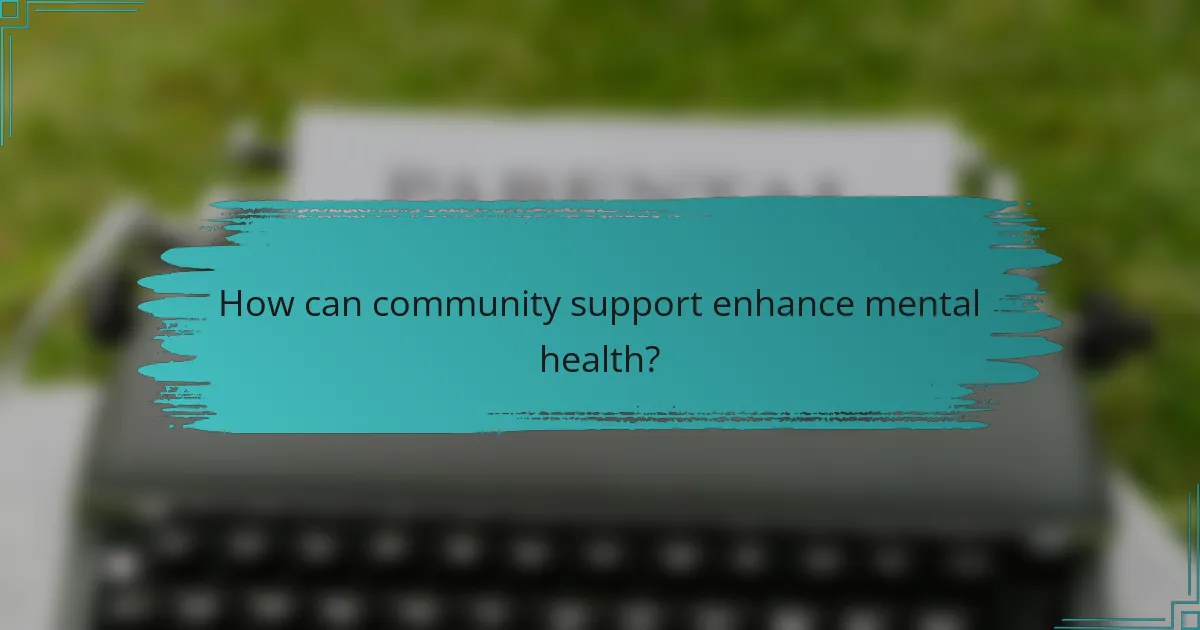
How can community support enhance mental health?
Community support can significantly enhance mental health by providing individuals with a sense of belonging and shared experience. Engaging with others in supportive environments fosters resilience and offers practical resources for coping with mental health challenges.
Local mental health organizations
Local mental health organizations play a crucial role in providing resources, counseling, and support groups tailored to community needs. They often offer services such as therapy sessions, crisis intervention, and educational programs aimed at raising awareness about mental health issues.
For example, organizations may provide sliding scale fees for therapy, making mental health care accessible to individuals from various economic backgrounds. It’s beneficial to research and connect with these organizations to understand the specific services they offer in your area.
Peer support networks
Peer support networks consist of individuals who share similar experiences and challenges related to mental health. These networks can provide emotional support, practical advice, and a safe space for sharing personal stories without judgment.
Joining a peer support group can help individuals feel less isolated and more understood. Many communities offer these networks both in-person and online, making it easier to find a group that fits your needs and schedule.
Community workshops
Community workshops focused on mental health can equip individuals with valuable coping strategies and skills. These workshops often cover topics such as stress management, mindfulness, and effective communication, which can enhance overall well-being.
Participating in these workshops can also foster connections with others, creating a supportive community atmosphere. Look for local events or online webinars that focus on mental health topics relevant to your interests and needs.
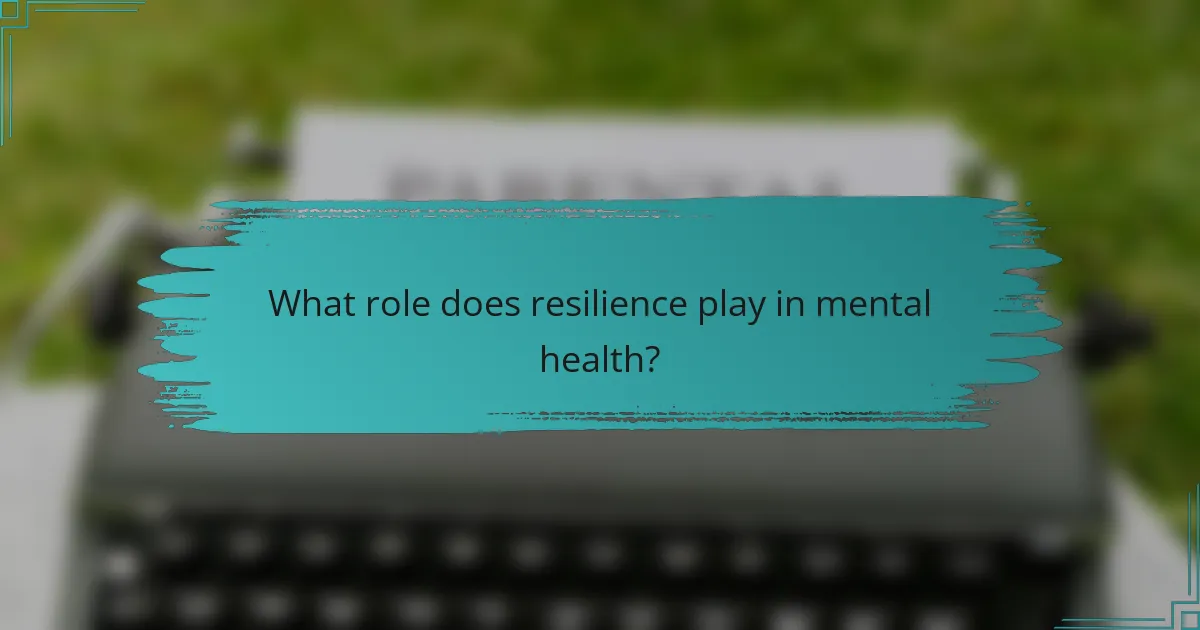
What role does resilience play in mental health?
Resilience is crucial for mental health as it enables individuals to adapt to stress and adversity, promoting emotional well-being. It helps people recover from setbacks and maintain a positive outlook, which is essential for overall mental wellness.
Definition of resilience
Resilience refers to the ability to bounce back from challenges and maintain psychological stability. It involves coping effectively with stress, trauma, and adversity, allowing individuals to navigate life’s difficulties while preserving their mental health.
This quality can be developed over time and is influenced by various factors, including personality traits, social support, and life experiences. Resilience is not about avoiding stress but rather about managing it constructively.
Benefits of resilience
Building resilience offers numerous benefits for mental health, including improved emotional regulation and a greater sense of control over one’s life. Resilient individuals are often better equipped to handle stress, leading to lower rates of anxiety and depression.
Additionally, resilience fosters stronger relationships and social connections, which are vital for support during tough times. This interconnectedness can enhance overall well-being and provide a buffer against mental health issues.
Building resilience through challenges
Facing challenges is a key way to build resilience. Engaging in problem-solving, seeking support, and maintaining a positive mindset can help individuals grow stronger in the face of adversity. For example, setting small, achievable goals can foster a sense of accomplishment and boost confidence.
It’s important to recognize that setbacks are a natural part of life. Embracing these experiences as opportunities for growth can enhance resilience. Practicing self-care, such as regular exercise and mindfulness, can also contribute to developing this vital trait.
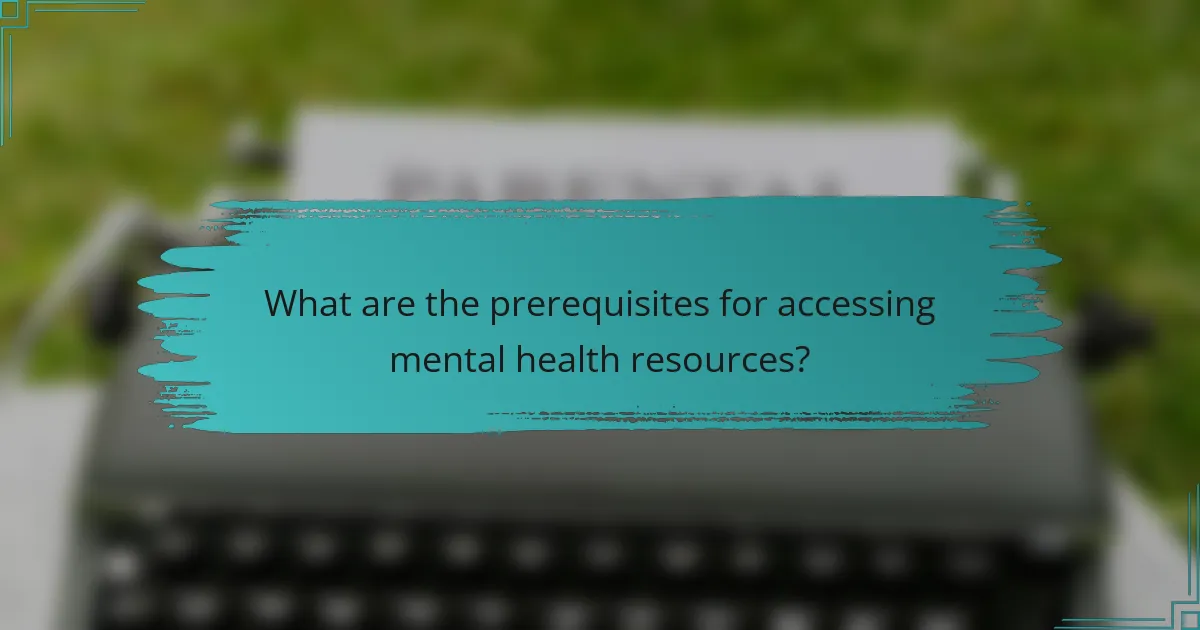
What are the prerequisites for accessing mental health resources?
To access mental health resources, individuals typically need to understand their specific needs and the types of services available. This may involve recognizing symptoms, seeking referrals, or understanding insurance coverage.
Understanding mental health conditions
Understanding mental health conditions is crucial for accessing appropriate resources. Common conditions include anxiety disorders, depression, and bipolar disorder, each requiring different approaches for management and treatment.
Individuals should familiarize themselves with the symptoms and impacts of these conditions, as this knowledge can guide them in seeking help. For example, recognizing persistent sadness or excessive worry can prompt a person to reach out for support.
Identifying available services
Identifying available mental health services involves researching local options such as therapists, support groups, and hotlines. Many communities offer resources through hospitals, clinics, and non-profit organizations, often at low or no cost.
It’s beneficial to check if your health insurance covers mental health services, as this can significantly affect accessibility. Additionally, utilizing online directories can help find professionals who specialize in specific conditions or treatment modalities.
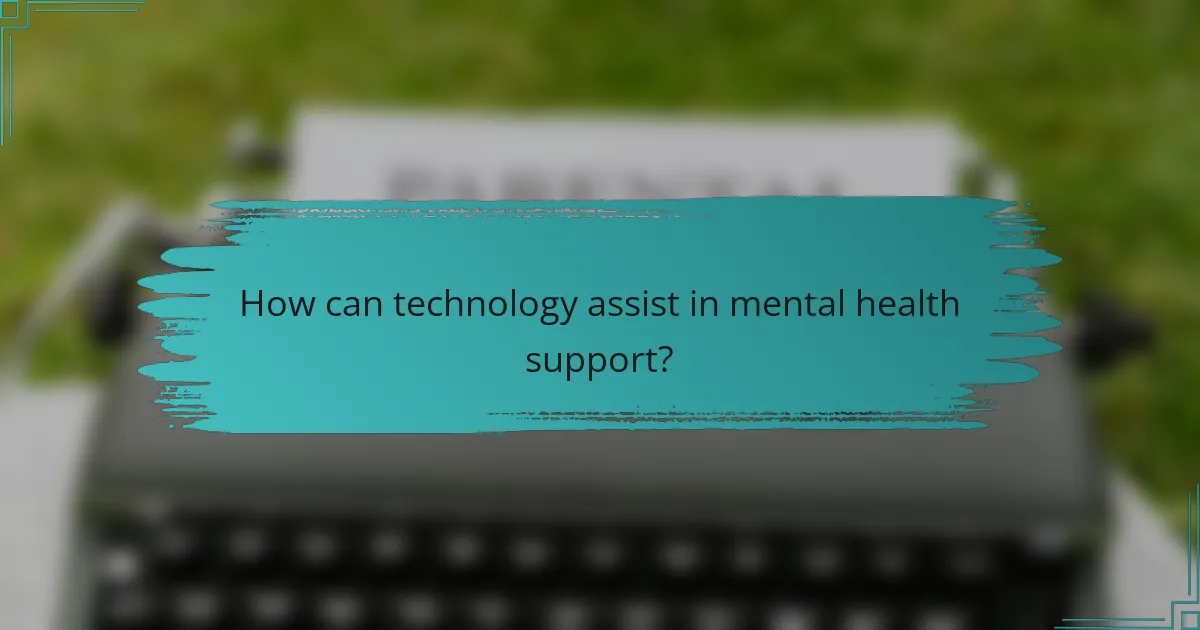
How can technology assist in mental health support?
Technology can significantly enhance mental health support by providing accessible resources and tools for individuals seeking help. Through various platforms, users can access therapy, self-help resources, and community support, making mental health care more convenient and tailored to individual needs.
Mental health apps
Mental health apps are designed to help users manage their mental well-being through various features such as mood tracking, guided meditation, and cognitive behavioral therapy exercises. These applications can be downloaded on smartphones, making them easily accessible anytime and anywhere.
When choosing a mental health app, consider its features, user reviews, and whether it aligns with your specific needs. Popular options include apps focused on mindfulness, stress reduction, or anxiety management. Some apps may offer free versions, while others might require a subscription, typically ranging from $5 to $15 per month.
To maximize the benefits of mental health apps, set realistic goals for usage. Regularly engage with the app’s features, and avoid relying solely on it for support. Combining app usage with professional help or community resources can lead to more effective mental health management.
